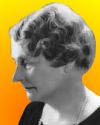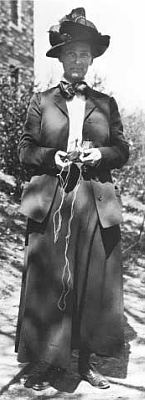 (source)
(source)
|
Florence Bascom
(14 Jul 1862 - 18 Jun 1945)
American geologist who is remembered for achieving a number of firsts as a woman in the field of geology.
|
Florence Bascom
14 July 1862 (Williamstown, Mass.) - 18 June 1945
Florence Bascom's early interest in geology is attributed to a driving tour with her father and his friend Edward Orton, a geology professor at Ohio State.
She studyied at the University of Wisconsin, completing her third batchelor's degree in 1884 and a Master's degree (1887). Then, at Johns Hopkins University in 1893, Bascom became the second woman to complete her Ph.D. studies there, but the first woman to actually receive* a doctorate from that institution. This accomplishment was recognized in The Chautauquan (Vol. 16, 1893, p. 739-40), the publication of the Chautauqua Literary and Scientific Circle, which said:
The cause for the advancement of women has scored another point and a strong one. The graduate department of the Johns Hopkins University has been declared open to women. There is to be no annex, no special department, but the superior advantages and all the educational facilities which men command at that university in the pursuit of studies leading to the higher degrees are to be made available for women. In 1877 the trustees of Johns Hopkins passed a resolution admitting women to the graduate courses in the university, but this action never received the confirmation of the university faculty until recently. The test was brought about one year ago by Miss Florence Bascom, who applied for admission to the graduate department. Her application did not meet with favor at that time but early in the present academic year Miss Bascom's case was again taken up by the university faculty and her cause and the cause of women generally was championed in that body by Professor Griffen, the accomplished dean of the undergraduate faculty and a man of exceedingly broad spirit. The result was entirely successful and in June Miss Bascom will receive the degree of Doctor of Philosophy, the first honor ever conferred upon women by the Johns Hopkins University. With the graduate departments of this leading American institution thrown open to women and the opportunity for advanced medical training which will be afforded with the opening of the medical department of the same university on a coeducational basis, the cause of higher education for women will have advanced very materially.
Similarly, in the U.S. as a whole there was one woman, Mary Holmes, who had earned a Ph.D. in the field of geology earlier, in 1888, from the University of Michigan.
Nevertheless, she truly merits accolade first woman geologist by her accomplishments. These were described in the Geological Society of America's magazine, GSA Today, in July 1997 as follows:
"Bascom was the first woman hired by the U.S. Geological Survey (1896), the first woman to present a paper before the Geological Society of Washington (1901), the first woman elected to the Council of the Geological Society of America (elected in 1924; no other woman was elected until after 1945), and the first woman officer of the GSA (vice president in 1930). She was an associate editor of the American Geologist (1896-1905) and a four-starred geologist in the first edition of American Men and Women of Science (1906), which meant that her colleagues regarded her as among the country's hundred leading geologists. After joining the Bryn Mawr College faculty, Bascom founded the college's geology department. This site became the locus of training for the most accomplished female geologists of the early 20th century."
* One other woman completed her studies for a Ph.D. in 1882 at Johns Hopkins University but the trustees refused to grant her the degree at that time. It was not awarded to her until 1926.
- Science Quotes by Florence Bascom.
- 14 Jul - short biography, births, deaths and events on date of Bascom's birth.
- Florence Bascom - comprehensive, illustrated, biography on 'Rock Star' Florence Bascom in GSA Today (1997).






